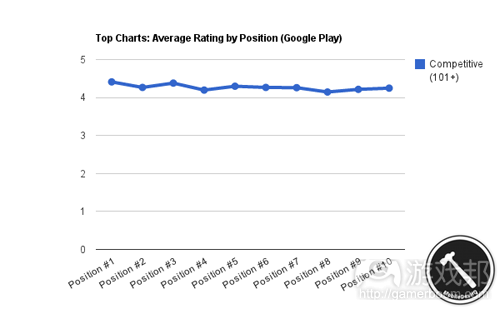分析称Google Play排名算法更重视应用评级情况
作者:Ian Sefferman
(本文作者是应用商店优化和营销服务供应商MobileDevHQ联合创始人及首席执行官)
众所皆知,应用商店的搜索结果和热门榜单排名一般都会将应用评级作为考虑因素之一。这不仅有助于推高应用排名,还能够方便用户筛除不相关产品,顺利找到自己所需应用。
但我们只知评级情况会影响应用搜索结果显示位置和榜单排名,又是否知道它如何影响应用搜索结果显示位置?
iOS App Store
搜索排名
人们一般会凭直觉认为,应用所得评级越高,其搜索排名也就越靠前。这正是我们调查数据所发现的一个趋势,但也一些例外情况。
在iTunes App Store,在搜索结果中排名越靠前的应用,一般也都是评级更高的产品。我们随机选择了“简单”、“中等”和“竞争激烈”三个级别的搜索字段进行调查。在这里,“简单”搜索字段意味着其搜索结果在1-25个之间,“中等”字段则有26-100个搜索结果,“竞争激烈”字段则有101个以上搜索结果。然后我们计算了排名第1至第10名的应用评级情况,发现从第8名开始,应用评级情况就开始急剧下滑。
我们原先认为在这三种字段的搜索结果中,排名前10的应用均是拥有最高评级,并且与关键字最为匹配的应用。但数据表明,如果是在“简单”字段搜索过程中,排名第10的应用所得评级也可能低至1.09分。这种低分与其较高的搜索排名位置并不相称。而从“竞争激烈”字段搜索结果来看,第10名应用评级也可能低至2分左右(游戏邦注:其原始数据取自苹果推出Chomp Update这项影响iTunes App Store应用排名的举措之前)。
热门榜单排名
更令人意外的是,iOS热门榜单的排名情况也反映了类似情况。这表明位居榜单前列的应用并不一定拥有较高的评级得分。人们通常会认为,除了下载量之外,热门榜单还会将评级得分作为排名考虑因素,但我们的数据却没有反映这种结果。
由此可见,评级情况并非决胜因素,它当然有一些作用,但其影响力却远逊于下载量等其他因素。
Google Play
搜索排名
我们也针对Google Play进行了同样的分析,发现无论是在“简单”、“中等”还是“竞争激烈”字段搜索结果中,排名前10的应用都有较高评级,并没有出现像iTunes App Store那种非正常的应用评级下滑情况。我们认为这反映了Google Play在搜索排名上比iTunes App Store更重视应用评级情况。
由此我们可得结论,高评级/高质量应用一般也更有可能显示在Google Play搜索结果前列位置。Google Play搜索算法更有利于提升高质量应用的曝光度。
热门榜单排名
Google Play的热门榜单统计结果也反映了同种趋势,即评级越高的应用晋升热门榜单前列的机率更大。尽管评级情况并非应用晋升至榜单前列的唯一因素,但却是必要因素之一。
结论
那些同时高居搜索结果和热门榜单排名前列的应用一般都有较高的评级得分,这种趋势在Google Play的表现比iTunes App Store更为明显。(本文为游戏邦/gamerboom.com编译,拒绝任何不保留版权的转载,如需转载请联系:游戏邦)
How rating affects ranking in search results and top charts across platforms
Ian Sefferman
Ian Sefferman is co-founder and CEO of MobileDevHQ, a company that provides app store optimization and marketing tools. His guest post contains data pulled from the company’s backend and an analysis of how a mobile app’s rating in the App Store and Google Play top charts can be correlated to an app’s rank in search. You can follow him on Twitter, @iseff, or read his blog.
It’s clear that app stores take app ratings into account when ranking an app in search results and top charts. Not only does this help propel deserving apps to the top, but it also helps you sort through all the crap that unfortunately and inevitably clogs app stores.
But, beyond knowing that rating does affect search position and chart rankings, how does rating affect search position?
iOS
Search Rankings
Intuitively, you would expect that the higher an app is rated, the higher it will rank. That’s essentially what our data showed, with one important twist.
In iTunes App Store, the higher positions generally had higher rated apps. We took a random sample of “easy” search terms, “medium” search terms and “competitive” search terms. For the purposes of this post, easy is defined as having 1 to 25 results, medium as having 26 to 100 results and competitive as having more than 101 results. We then averaged the ratings of apps from positions 1 through 10. The twist is that, on average, rating drops significantly after position 8.
Our rational thought process for understanding the top 10 results for any search term is that the first 10 apps will be the highest rated, as well as the most relevant for that keyword. But, as the data shows, the ratings can reach as low as 1.09 for an app ranked tenth for an “easy” search term. That’s a pretty terrible rating paired with a respectable search ranking. Although visibility for an app ranked tenth for easy search term is not nearly as impressive as that for a No. 10-ranked app for competitive keywords, the rating for an app ranked No. 10 for competitive keywords is still, on average, down to a little over 2.
The initial data we pulled for this analysis was taken prior to Apple’s Chomp Update, which is significantly changing how iTunes App Store is ranking apps. That said, our initial analysis shows that average rating has not played a major part in this change. We’ll keep watching for updates.
Top Charts
Even more surprisingly, iOS top charts behave very similarly, if not a little worse. What this means is that the apps in the top charts did not necessarily reach that pinnacle of visibility through ratings alone. We know that download velocity has a lot to do with top charts, but it would seem intuitive that inclusion in Top Charts would, among other things, mean high ratings. The data, however, does not back this up.
Drawing from this, it means rating isn’t everything. It means something — but it certainly seems to mean a lot less than other factors such as download velocity.
Google Play
Search Rankings
We performed the same analysis for Google Play. What we found is that the top 10 search results returned for any difficulty were rated highly; there was no drop like the one seen in the iTunes App Store. We believe this means Google Play weights rating more heavily in search rankings than iTunes App Store does.
From that, we can draw the conclusion that high rating/high quality equals a higher chance of breaking into Google Play’s higher-ranked search echelons. Google Play’s search algorithm seems to take a more meritocratic approach to app discovery and visibility, letting higher quality apps rise to the top.
Top Charts
Yet again, Google Play’s Top Charts calculations appear to value high ratings heavily in top charts. While a high rating may not be sufficient to be in the top charts, it would appear to be necessary.
Conclusion
Those apps fortunate enough to find themselves within the top strata of either search results or top charts are generally rated highly. This trend, however, appears to be more true on Google Play than on the iTunes App Store.(source:insidemobileapps)

























.png)

















 闽公网安备35020302001549号
闽公网安备35020302001549号